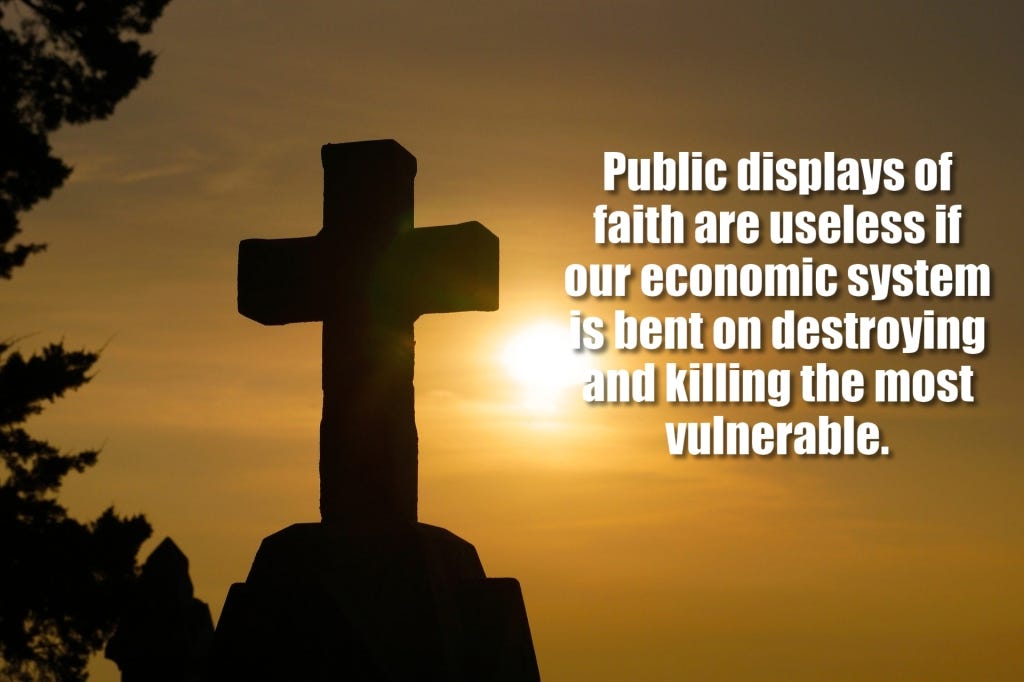Day 11: The Necessity of Economic Justice
#RethinkChurch is doing a 22-day journey for self-reflection based on John Wesley’s 22 questions. I will be trying to compose short blog posts addressing each question. I am using these posts to encourage Christians, especially Progressive and Mainline Christians to reflect deeply on what it means to be Church in a world marred by oppression and violence.
Day 11: Do I pray about the money I spend?
There is an abundance of workshops, books, and programs out there that provide advice on personal finances. Some of the advice is good but most is classist and ignore the larger structural realities that prevent people from “picking themselves up by their boot straps” and becoming financially independent. To be honest, I’m sure all of us could tweak our spending habits to try and be in a healthier spot financially. But the major issues are systematic.
Many politicians in the United States make a big deal about wanting the United States to return to its “Christian roots,” they promise to put “prayer” back into schools, and they seek to propagate the myth that Christians in the West, and specifically the United States are under major threat of persecution.
Yet when it comes to dealing with the very real structural issues that keep people in poverty, silence. When it comes to supporting programs made to help the poor such as food stamps, affordable housing, access to medical care and reducing the cost of higher education the discourse suddenly becomes about curbing big government and avoiding government overreach. This obsession over government overreach is hypocritical coming from politicians that want to force their narrow and distorted version of Christianity on the populace.
The United States’ economic priorities are skewed and these priorities are reinforced by a distorted version of Christianity. The Christianity that many American politicians claim to embrace is a false one that expresses disdain and even hatred towards the disenfranchised.
And the kicker is, that while politicians, especially at the federal level, may be wealthy, many of their constituents that support their policies are struggling to get by. Their supporters are not necessarily just the ultra-wealthy but many are part of the middle class, working class, working poor etc. Many also consider themselves to be devout Christians. They have bought into the American gospel of self-sufficiency and wealth even though they do not benefit from it.
Many Americans struggle to pay their bills, to find jobs that pay a living wage, to access medical care, to keep a roof over their heads. It doesn’t have to be like this. Instead of lambasting the “communist/socialist” bogeyman that many politicians reference, we should be working to ensure that no one dies because they can’t afford their overly priced insulin or to get regular checkups at the doctor.
We should be pushing back against attempts to literally yank foods out of people’s mouths by cutting food stamps. We should be demanding that companies that make millions upon millions of dollars and pay very little to no taxes, pay their employees and contractors a living wage. Instead of creating another branch of the military a la the Space Force, we should be critically examining military spending. I remember hanging out with political scientists and listening to them debate whether military spending distracts and takes away from domestic social program. This is debate worth having.
Public displays of faith are useless if our economic system is bent on destroying and killing the most vulnerable.
Day 1: Illusions of Perfection
Day 2: The Dangers of Embellishment
Day 3: Loose Lips Sink Ships or Silence Kills?
Day 5: The Oppression of Professionalism
Day 6: Mental Illness and Distorted Thinking
Day 8: Making Sense of the Bible



